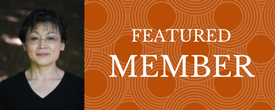Submitted by Shizuka Modica, PhD, ACC for the Positive Living Newsletter (November 2016). Read the rest of the newsletter here.
Farming Village to Kyoto and to America
 Running through the neighborhood, climbing a giant tree in our public plaza, making mud pies in the back yard—these are some of the activities I enjoyed doing with other kids for the first few years of my life in a farming community in Futami, Mie, Japan in the 60s. My dad was the first technical college goer in his farming family. He became a ball-bearing engineer and worked for a small company in a nearby city. My mother grew up in a fishing village, Shima, where her family ran a restaurant; she helped the family business and was a diver for sea delicacies. Not needing to read or write for a living, my mother didn’t go to high school and was semi-illiterate. When she married and had kids, she stayed home, raising three girls and attending our big vegetable garden.
Running through the neighborhood, climbing a giant tree in our public plaza, making mud pies in the back yard—these are some of the activities I enjoyed doing with other kids for the first few years of my life in a farming community in Futami, Mie, Japan in the 60s. My dad was the first technical college goer in his farming family. He became a ball-bearing engineer and worked for a small company in a nearby city. My mother grew up in a fishing village, Shima, where her family ran a restaurant; she helped the family business and was a diver for sea delicacies. Not needing to read or write for a living, my mother didn’t go to high school and was semi-illiterate. When she married and had kids, she stayed home, raising three girls and attending our big vegetable garden.
Families in our village shared resources and depended on each other’s help in farming their land. Before industrial machines were widely introduced, the village organized communal rice planting and harvesting; work on specific dates was dedicated to one family’s land. Villagers rotated through one family’s land to another. While adults were busy working in rice paddies, kids roamed around collecting wild flowers and occasionally falling into a cattle manure pit hidden in the fields. In autumn, kids got to climb into huge wooden pales and stomped radishes inside to make pickles for wholesale—akin to grape crushing in wine-making. When a young couple tied the knot, villagers donated their labor to build a house for them. So many fun memories. How I experienced this community laid a foundation for my sense of work: “We are interdependent; collaborative work is fun and we can get a lot more done together for both individual and greater goods.”
 When I was seven, my family moved to Kyoto for my dad’s job. Our environment radically changed from the “free-roaming” of the rural village to the “culturally and intellectually advanced” Zen Mecca, Kyoto. My mother adjusted to this new environment quite well. She taught herself how to read and write and became an educational advocate for us. She willingly worked several “menial” jobs to make ends meet and pay for our after-school lessons in calligraphy, swimming, math, and English. I ended up going to a prestigious private high school and went onto a well-recognized private college in Kyoto. In 1981 when I was still in college, I married an American. Ever since, my husband and I have been moving back and forth between Japan and the U.S.
When I was seven, my family moved to Kyoto for my dad’s job. Our environment radically changed from the “free-roaming” of the rural village to the “culturally and intellectually advanced” Zen Mecca, Kyoto. My mother adjusted to this new environment quite well. She taught herself how to read and write and became an educational advocate for us. She willingly worked several “menial” jobs to make ends meet and pay for our after-school lessons in calligraphy, swimming, math, and English. I ended up going to a prestigious private high school and went onto a well-recognized private college in Kyoto. In 1981 when I was still in college, I married an American. Ever since, my husband and I have been moving back and forth between Japan and the U.S.
Meaning-Centered Work
How did I get involved in meaning-centered work? I stumbled onto it through my interest in high performance. In the 90s when I worked as an international education administrator and publicist at a Japanese university, I often wondered why some people were not putting their level best toward the institutional mission. I also witnessed that top leaders’ saying-doing gaps created organizational chaos and discouraged employee engagement. These observations and my curiosity for solutions motivated me to pursue graduate study in higher education in the U.S.
During my graduate study, I realized that meaningful work resulted in high productivity. Dr. Frankl’s universal perspective on the search for meaning became the core of my quest for a workable theory to explain and predict human performance (and thus organizational performance). Considering globalization of the workforce, his perspective, which cut across demographic characteristics, was very fitting. Accordingly, synthesizing existential psychology, positive psychology, and management literature, I created the “Meaning-of-Work (MOW) Theory for High Performance.”
Unlike well-established management or leadership theories, the MOW Theory does not provide a convenient checklist of behavioral “to-do’s.” Instead, the theory offers opportunities to cultivate heightened awareness and deep contemplation for active meaning-making. If we become more aware of our habitual automaticity and develop mental space through some reflective practice, we can choose from moment to moment our feeling, thinking, and acting. This is possible because through steady reflective practice, our brain changes over time. We can choose to behave differently toward personal growth, positive meaning, and flourishing of ourselves and others. Yes, I am an idealist; yet I am not alone!
My desire for collective flourishing became intensified as I became keenly aware of my sense of work from my childhood and as I experienced and witnessed school and workplace bullying and suffering. Simply put, the oppression of others creates unnecessary suffering in the workplace. I desire to see suffering minimized and more people discover meaning in their work. I am on this evolving journey to encourage individual and organizational flourishing toward the ideal of a more productive and just society.
INPM and the Meaningful Work Group
This year, I joined the INPM, prompted by my research and workshop proposals for the 9th International Meaning Conference. Sure enough, when I attended the conference in July in Toronto, I experienced a sense of “home-coming.” I met so many “like-minded” energetic people there. Naturally, when INPM announced to found a special interest group, “Meaningful Work Group,” I signed up to be a founding member.
Meaningful Difference
To make a meaningful difference through my work, I do two things. First, I question the practices of investor-focused capitalism and invite others to explore conscious capitalism, meaningful capitalism, and the Post-GDP Movement (e.g., Bhutan’s Gross National Happiness Index). Second, I try my best to “walk the talk” to encourage positive meaning-making in the workplace. I let my understanding on meaning-making guide me to do the right thing albeit occasional (or frequent) failures to do so. By honoring every encounter with others and by expanding my research on meaningful work, I hope to manifest what the MOW Theory represents—individual and organizational flourishing.
I end this introduction with a request for help. I am currently seeking organizations that are open to participate in my theory validation research and/or organizational interventions using the MOW Theory. If you are interested, please contact me at shizuka@imi-sustainablegrowth.com.

 Meaning Conference 2025 will be the INPM’s first in-person conference with a virtual option after the pandemic.
Meaning Conference 2025 will be the INPM’s first in-person conference with a virtual option after the pandemic.